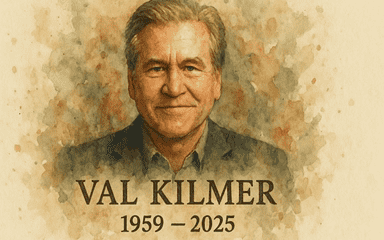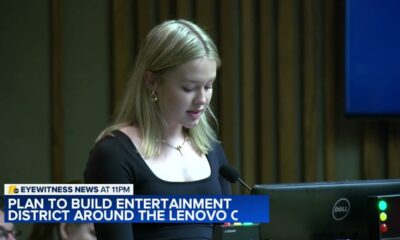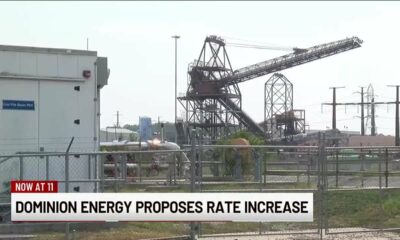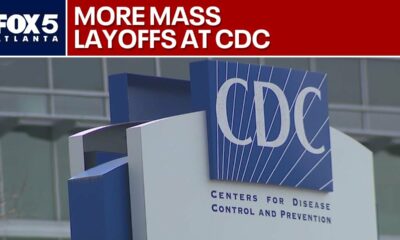News from the South - Virginia News Feed
Voting begins on Richmond’s $3 million People’s Budget
by Charlotte Rene Woods, Virginia Mercury
April 1, 2025
Last summer, the city of Richmond made waves by announcing a $3 million dollar check for its residents to spend as they see fit. Now, the city is handing the reins over to its people, inviting everyone 14 years and older to vote on how that money should be allocated. From April 1 to 15, Richmonders can head to pop-up events around the city or log on to cast their votes for the projects they want to see funded in what the city has dubbed “The People’s Budget.”
Ideas on the table range from improvements to bus routes, tree plantings in underserved areas, and sidewalk enhancements for pedestrian safety, to more region-specific projects, like a “Welcome to Southside” sign at entry points to Richmond’s 8th City Council district, or better trail access to the James River in the 5th District.
Instead of just picking one project, the process uses ranked choice voting, allowing participants to express preference for several initiatives. The People’s Budget initiative, which was led by former city councilor and mayoral candidate Andreas Addison, started with other pop-up events and online solicitation to gather input from residents across the city.
As for the $3 million, it’s being divided across the city with a focus on equity. Isaac Samuels, lead organizer of the People’s Budget, explained that Districts 1, 2 and 4 will each get $200,000, while Districts 3, 5 and 7 will receive $300,000 each, and Districts 6, 8 and 9 will be allocated $500,000. The goal of this varied distribution is to direct funding to areas that have historically been underinvested in, ensuring that all of Richmond’s neighborhoods benefit.
Richmond’s Southside, home to many historically Black neighborhoods, has long faced challenges rooted in systemic inequality. Less tree canopy in these areas leads to higher ground temperatures during hot months, and a history of discriminatory housing policies has contributed to lower home values.
In the 1930s, appraisers marked Black-populated neighborhoods nationwide in red, labeling them “hazardous” for home loans. The lasting impact of these racist practices is still evident today, with each negative appraisal continuing to affect future evaluations and resulting in less local government investment in public infrastructure.
“This is a big milestone for us,” Samuels said.
After months of outreach and community engagement, Samuels is thrilled to reach the voting phase, knowing the projects selected will soon become a reality. With voting ending on April 15, he expects the results to be available by April 21.
From there, the implementation of winning proposals will vary based on which city departments are involved and the procedural steps leading up to any development work.
“We will be tracking it basically like a Domino’s Pizza Tracker on our website, noting every different step that we’re taking,” Samuels said.
Ranked choice voting
Ranked choice voting gives Richmond residents a better shot at seeing their favorite projects come to life. If their top choice doesn’t get enough votes, their other picks may still make the cut, giving them a greater sense of influence over the outcome.
This voting method has gained traction in Virginia in recent years. Former state delegate Sally Hudson carried legislation that was signed into law in 2020, allowing localities to adopt ranked choice voting for city council and board of supervisor elections. Arlington was the first to use it in 2023, and Charlottesville is set to implement it this year.
Richmond nearly became the first locality to adopt it in 2022, but city councilors were still unsure and ultimately voted it down. A major concern was that the law couldn’t be applied to school boards or citywide elections contests like Richmond’s mayor, who, unlike most Virginia localities, is separately elected instead of being a member of the city council.
This year, a bill from Sen. Saddam Salim, D-Fairfax, aimed to expand ranked choice voting, but it was recently vetoed by Gov. Glenn Youngkin. Youngkin, who used ranked choice voting to secure his victory in the 2021 Republican gubernatorial convention, explained in his veto that more data was needed before expanding the method.
He said doing so at this stage “risks institutionalizing a system that has yet to prove its effectiveness in broader elections.”
However, Hudson, now executive director of Ranked Choice Virginia, argues that Youngkin is overlooking “the growing body of evidence” showing successful ranked choice voting trials.
Arlington has already used it in several elections, and Falls Church and Loudoun county are also considering adopting it. Both Hudson and UpVote Virginia executive director Liz White have pointed to expanding use of ranked choice voting nationwide.
“I definitely see an increase in just people being familiar with it. I think that that, for us, is the biggest measure of progress,” White said. “The more people use it, the more people know about it, the more they like it.”
While more local elections are still waiting for the ability to use this method, White is thrilled to see it applied in Richmond’s People’s Budget.
“There’s more nuance to (residents’) votes and they can provide so much more information with their vote,” White said. “I think that’s really cool.”
To vote online in the People’s Budget, click here. For more details on in-person voting, click here.
YOU MAKE OUR WORK POSSIBLE.
Virginia Mercury is part of States Newsroom, a nonprofit news network supported by grants and a coalition of donors as a 501c(3) public charity. Virginia Mercury maintains editorial independence. Contact Editor Samantha Willis for questions: info@virginiamercury.com.
The post Voting begins on Richmond’s $3 million People’s Budget appeared first on virginiamercury.com
News from the South - Virginia News Feed
Dominion Energy proposes to increase rates starting summer 2025
SUMMARY: Dominion Energy plans to increase rates starting summer 2025, with an average increase of about $20 per month. The company cites inflation, high labor costs, and the need for power grid upgrades as reasons for the hike. This is the first rate increase since 1992, and residents express concerns that higher prices won’t improve service reliability. Proposed changes include a $10.92 increase in fuel rates from July 1, followed by base rate increases of $8.51 and $2 in subsequent years. Critics emphasize the need to avoid overburdening residential customers while accommodating increased demand from data centers.

They’re blaming the jump on the pressure of inflation, high labor costs, and the need for power grid upgrades and supplies.
For more Local News from WWBT: https://www.12onyourside.com/
For more YouTube Content: https://www.youtube.com/channel/UCh-MRi3cyDN0DO1AvvVYFlg
#dominionenergy #consumer #Virginia #Richmond #12onyourside #localnews #money
News from the South - Virginia News Feed
Political theater takes center stage as legislature returns for veto session
by Markus Schmidt, Virginia Mercury
April 2, 2025
The Virginia General Assembly is set to reconvene Wednesday for what will likely be a long, one-day session that’s equal parts policymaking and political theater, as lawmakers face off over Gov. Glenn Youngkin’s sweeping amendments to 159 bills — including major changes to the state budget.
Youngkin finished acting on all 915 bills sent to him during the 2025 session by last week’s Monday midnight deadline. He signed 599, vetoed 157, and sent back 159 with recommended changes — including a staggering 205 proposed amendments to the budget bill, House Bill 1600, and eight item vetoes.
While many of the vetoes — including on bills to create an adult-use cannabis retail market, raise the minimum wage, allow public-sector unions and tighten how the Virginia Department of Elections processes voter registration data — were expected, none are likely to be overridden. That would require a two-thirds majority in both chambers, and Democrats hold only slim leads: 51-49 in the House, and 21-19 in the Senate.
Governor unleashes veto storm to drown progressive legislation
Instead, the real legislative drama lies in how lawmakers will handle the governor’s amendments — especially those to the budget and several controversial policy bills that set the stage for a partisan clash that could shape not just legislation, but the narrative heading into this fall’s critical gubernatorial and House of Delegates elections.
Stephen Farnsworth, a political analyst from the University of Mary Washington, offered a candid assessment of Virginia’s current legislative dynamics this year, characterizing both the regular and Wednesday’s veto session as exercises in political positioning rather than substantive governance.
“This was a kick-the-can-down-the-road legislative session, and it will be a kick-the-can-down-the-road veto session,” he said.
According to Farnsworth, lawmakers from both sides are focused on shaping narratives ahead of the November elections rather than crafting major policy shifts.
While he expects the veto session to be largely uneventful — “Veto sessions are usually anti-climactic as long as there is general overall agreement on the shape of the budget, and for the most part there is” — he acknowledged that some amendments might slightly nudge legislation in Youngkin’s favor.
One such example Farnsworth pointed to was the governor’s initiative to explore making Oak Hill, the historic residence of President James Monroe in Fairfax County, a state park. He noted the unusual nature of the proposal, given the region’s political leanings and spending patterns.
“Republicans don’t often say ‘let’s spend money in Northern Virginia,’” Farnsworth observed, adding that some Democrats might find the idea more palatable than expected: “There might be some Democratic lawmakers who might say it’s easier to say yes to this than no.”
One example of a proposal that is expected to be caught in limbo, however, is HB 1923, which seeks pay parity for midwives. Rather than sign or veto the bill, Youngkin proposed an amendment requiring the Health Insurance Reform Commission to assess the issue and added a reenactment clause — meaning the bill would need to pass again in 2026 to become law.
Youngkin signs several maternal health bills, tweaks another on unconscious bias training
On the matter of cultural competency and unconscious bias training, Youngkin is once again pushing back. For the second year in a row, he’s offered an alternative to Senate Bill 740 by Sen. Mamie Locke, D-Hampton, and HB 1649 by Del. Cliff Hayes, D-Chesapeake, which would require medical professionals to complete such training to renew their licenses.
As in 2024, Youngkin’s proposed substitute eliminates references to “unconscious bias” and “cultural competency,” replacing them with language focused on serving populations with high maternal mortality and related health disparities. His version also caps the training at two hours.
While Youngkin has expressed support for expanding access to doulas, his amendment to HB 1614 by Del. Adele McClure, D-Arlington, and SB 1418 by Sen. Lashrecse Aird, D-Petersburg, which would allow up to 10 doula visits to be covered by state health insurance, raised eyebrows by changing “birthing people” to “birthing women.”
Supporters argue the original language was meant to be inclusive, since it reflects the fact that transgender and nonbinary people may become pregnant, groups which Youngkin’s edit excludes.
Youngkin also revised HB 2724 by Del. Charniele Herring, D-Alexandria, which regulates the use of automatic license plate recognition (ALPR) technology. While the bill originally limited data retention to 21 days, his amendment extends that to 30 — a modest expansion that still keeps a firm deletion requirement.
The bill strictly regulates how law enforcement can use ALPR data — only in criminal investigations, missing persons cases, and tracking stolen vehicles or wanted individuals — and requires state approval of all such systems.
In the realm of data centers, Youngkin amended HB 1601, sponsored by Del. Josh Thomas, D-Prince William, loosening requirements for environmental and noise assessments.
The original bill required a detailed site analysis before new high-energy -use facilities (HEUFs) could be approved. Youngkin’s version makes that optional for localities and adds flexibility for examining other environmental impacts. He also clarified that the bill wouldn’t take effect unless reenacted in 2026 and wouldn’t interfere with local zoning powers.
Youngkin’s most sweeping changes come in the budget, where he rolled back major Democratic spending priorities.
Youngkin tweaks state budget with eye on federal cuts, but embraces key spending
He also cut $20 million from a proposed rental assistance pilot and removed $15 million designated for a first-time homebuyer grant program. His amendments further eliminate $138 million allocated for school support staff, along with $25 million for HVAC upgrades at Nottoway Correctional Center.
He revived a previously rejected proposal to allocate $25 million for private school scholarships, which would offer $5,000 vouchers to 5,000 low-income families to use toward nonpublic education — a move critics say siphons resources from public schools.
Democrats had proposed tax rebates to return about $1 billion to Virginians. Youngkin pushed instead for structural tax changes, including eliminating the unpopular car tax and exempting tips from taxation — both ideas that were rejected by the legislature.
Still, Youngkin embraced a core Democratic initiative by proposing to make 20% of the Earned Income Tax Credit permanently refundable. Without that change, the enhanced refundability is set to expire in 2027.
He also added controversial language that would withhold state funding from local law enforcement agencies that fail to cooperate with U.S. Immigration and Customs Enforcement (ICE).
Not all of Youngkin’s recommendations were partisan flashpoints. He agreed to send out tax rebate checks — $200 for individuals and $400 for joint filers — and backed bonus payments for public workers. Teachers would receive $1,000 bonuses, while state employees would get 1.5% bonuses on top of their already approved 3% raises starting July 1.
The Democratic majority has the numbers to reject many of Youngkin’s amendments without triggering a budget crisis. Thanks to Virginia’s biennial budget system, state funding is already in place for the fiscal year that begins July 1. However, any budget item rejected by the legislature could still be vetoed individually by the governor.
And Wednesday’s session may not be the last word on the budget. Lawmakers could reconvene later in a special session to address unforeseen federal impacts, such as layoffs or funding cuts, under the terms of a resolution passed earlier this year.
GET THE MORNING HEADLINES.
Virginia Mercury is part of States Newsroom, a nonprofit news network supported by grants and a coalition of donors as a 501c(3) public charity. Virginia Mercury maintains editorial independence. Contact Editor Samantha Willis for questions: info@virginiamercury.com.
The post Political theater takes center stage as legislature returns for veto session appeared first on virginiamercury.com
News from the South - Virginia News Feed
Funding for program DC firefighters used in Potomac crash recovery under review | NBC4 Washington
SUMMARY: Funding for the sonar technology used by DC firefighters in the Potomac crash recovery is under review by the Trump administration, amid broader federal spending freezes. Recently, first responders employed this advanced sonar system to quickly locate debris from a midair collision, significantly shortening the search time for victims’ families. The sonar, financed through a FEMA port security grant, has proven invaluable, even potentially uncovering remnants from past aviation tragedies. However, the program faces budget uncertainties, with the National Transportation Safety Board recognizing the critical role of these grants in ensuring safety. The future of such funding remains unclear as reviews continue.

After a regional airplane collided with an Army helicopter, D.C. Fire and EMS deployed sonar technology to scan the bottom of the …
-

 News from the South - Florida News Feed7 days ago
News from the South - Florida News Feed7 days agoFamily mourns death of 10-year-old Xavier Williams
-

 News from the South - Alabama News Feed6 days ago
News from the South - Alabama News Feed6 days agoSevere storms will impact Alabama this weekend. Damaging winds, hail, and a tornado threat are al…
-

 News from the South - Alabama News Feed5 days ago
News from the South - Alabama News Feed5 days agoUniversity of Alabama student detained by ICE moved to Louisiana
-

 News from the South - Louisiana News Feed7 days ago
News from the South - Louisiana News Feed7 days agoSeafood testers find Shreveport restaurants deceiving customers with foreign shrimp
-

 News from the South - Oklahoma News Feed4 days ago
News from the South - Oklahoma News Feed4 days agoTornado watch, severe thunderstorm warnings issued for Oklahoma
-

 News from the South - West Virginia News Feed7 days ago
News from the South - West Virginia News Feed7 days agoRoane County Schools installing security film on windows to protect students
-

 News from the South - Virginia News Feed5 days ago
News from the South - Virginia News Feed5 days agoYoungkin removes Ellis, appoints Cuccinelli to UVa board | Virginia
-

 News from the South - Florida News Feed6 days ago
News from the South - Florida News Feed6 days agoPeanut farmer wants Florida water agency to swap forest land








































